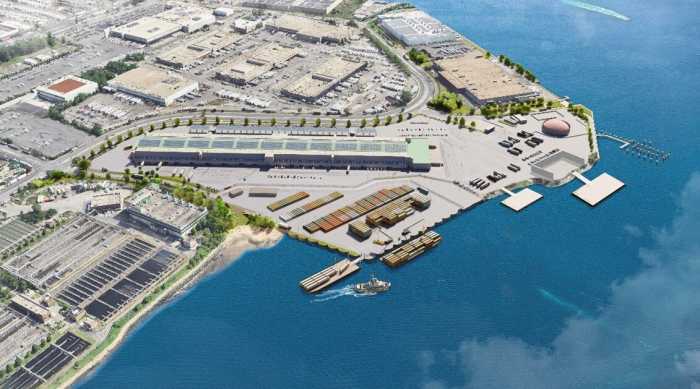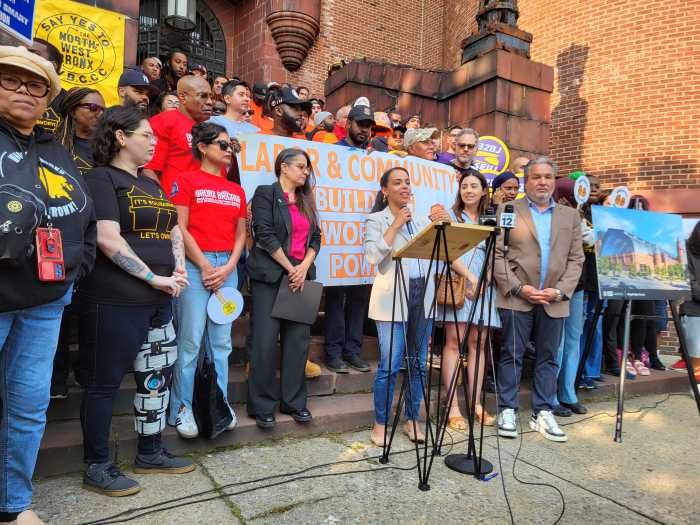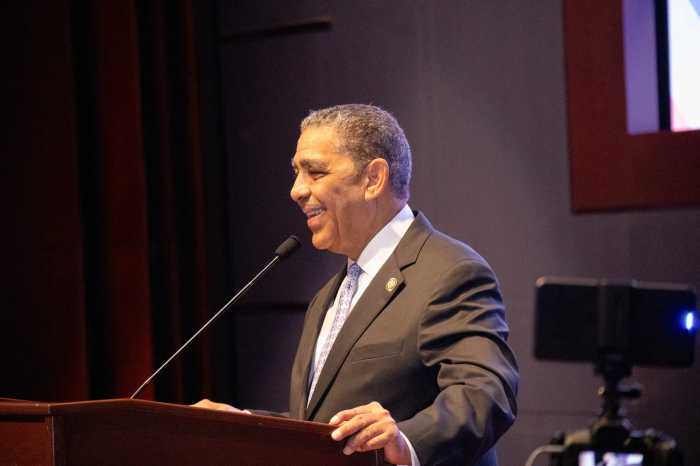With financing secured, the second phase of The Peninsula is moving forward to bring more income-restricted apartments to Hunts Point.
The Peninsula is a three-phase, five building development that is meant to transform the former site of the Spofford Juvenile Detention Campus into a mixed-use live-work campus.
Construction for phase two is starting next month, with an expected completion in 2026. This phase will bring two high-rises to The Peninsula campus, which already consists of two buildings. The third and final phase will bring an additional building, which is slated to be complete in 2029.
Financing for the second phase totaled $297 million provided by the NYC Department of Housing Preservation and Development (HPD), NYC Housing Development Corporation (HDC) and Wells Fargo, according to Gilbane Development Company and Hudson Companies, the developers for the project.
“We are thrilled to finalize the financial close on the next phase of this project. It represents the ongoing commitment in our mission to developing dynamic communities and providing the Hunts Point neighborhood with much-needed affordable housing,” said Ed Broderick, president and CEO of Gilbane Development Company. “To us, The Peninsula is not just about putting up buildings; it’s about creating a vibrant community where the Hunts Point community, individuals and families can flourish for many generations.”
Once all three phases are complete, the site will include 740 income-restricted units, 10,720 square feet of retail space, 52,300 square feet of community facility space — which includes an arts facility, a Head Start program and a health and wellness center operated by Urban Health Plan — and 57,000 square feet of open space.
The project is also slated to bring 260 underground parking spaces in total across two garages.
The first phase of the project, which was largely completed in 2022, brought two buildings to the western part of the site, with a light industrial building and a 14-story 183-unit affordable housing apartment building. While the 720 Tiffany St. apartment building welcomed residents in 2022, an arts facility and childcare education center in the same building have yet to open.
The arts space is slated to open in the fall, while the drawings and contractor selection are still being finalized for the interior of the childcare center, project spokesperson Shavone Williams, of Risa Heller, told the Bronx Times.
This next phase will bring about 359 units built across two 14- and 17-floor buildings, which will share a garage and plaza. These units will largely be reserved for households earning at or below 60% of the area median income, as well as 15% of units set aside for households that are formerly houseless. Residents will have access to a gym, in-building laundry, children’s playroom, lounge space, outdoor terraces and bicycle storage. A Head Start facility will also be built in this phase.
The third and final phase will bring a 13-story building with 200 units of income-restricted housing on the eastern portion of the site, which is bordered by Manida Street and Spofford Avenue.
The light industrial building built as part of the first phase rents out small production-based spaces for businesses and is expected to create at least 100 jobs over the next five years, Williams said. The space is currently rented by bakers, coffee roasters and noodle, tamale and greens producers, as well as an environmentally friendly athleisure designer and manufacturer, Williams said.
A shared incubator kitchen is also slated for the development, and will be created jointly with HotBread Kitchen for entrepreneurs who cook in their homes to expand production, she said.
“The Peninsula is years in the making and once completed, will be a lifeline to so many New Yorkers seeking housing in our borough with a focus on arts and culture, health and wellness, communal space, and sustainability,” said Bronx Borough President Vanessa Gibson.
The financing will come through HPD and HDC’s Extremely Low- and Low-Income Affordability programs.
The construction will be largely financed with the proceeds of tax-exempt bonds issued under HDC’s Open Resolution, with the rest coming from HDC and HPD subsidies and the sale of 4% Low-Income Housing Tax Credits.
Additional funding is also coming from Resolution A funds from City Councilmember Rafael Salamanca Jr., a sponsor loan funded from New York State Research and Development Authority grant funds, and a sponsor loan funded from refundable New York State Brownfield Tax Credits.
Reach Aliya Schneider at aschneider@schnepsmedia.com or (718) 260-4597. For more coverage, follow us on Twitter, Facebook and Instagram @bronxtimes























